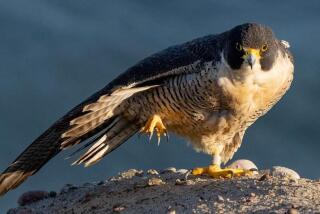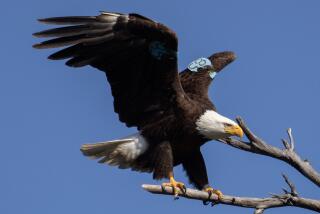Looking out for falcons’ spring fling
- Share via
With one eye closed and the other glued to his scope, biologist Al Ambler scanned the gray quartzite cliffs of Mt. Minsi for a pair of peregrine falcons attempting something not seen in this part of Pennsylvania in about 60 years: a feathered love affair.
He checked the usual ledges, then his eyes landed on a dead, white tree, poking like a toothpick out of the western bank of the Delaware River. In this tree, he said, the peregrine will perch before diving at unmatched speeds to catch its prey.
But this afternoon, the tree was empty.
“It doesn’t dismay me not to see it for a week,” said Ambler, who stops daily at an overlook off Route 611 in hopes of seeing the falcons. “Especially right now, when they’re breeding and spending most of their time on the eggs.”
For decades, falcons checked into Mt. Minsi’s crags for a private spring fling before being driven into local extinction. Now they are back, observers say, and though they have yet to hatch an egg, officials from the Delaware Water Gap National Recreation Area are taking no chances.
The park recently barred climbers from the cliff faces and closed paths that branch from the Appalachian Trail to the top of the mountain. It’s not the first time the park has hung the “Do Not Disturb” sign, but Ambler hopes this year the magic happens.
There are reasons to be cautious, however. For one, no one’s been able to confirm an actual nest, though officials suspect one exists. Even for professional bird voyeurs such as Ambler, observing these expansive cliffs and finding the birds can be difficult.
For another, this year’s would-be peregrine paramour is probably just a year-old male, a little young to court the ladies. Males typically nest when they are 3 years old, and females when they are 2.
“I wouldn’t place any bets,” said F. Arthur McMorris, peregrine falcon coordinator for the state Game Commission. “It’s not uncommon for pairs to fail in their first year trying. It’s not really a fertility issue; it’s more an experience and skill issue.”
Until the 1940s and ‘50s, Pennsylvania was home to 44 pairs of peregrines, most of which laid their eggs on cliffs such as Mt. Minsi’s to shield their young from foxes, raccoons and other predators. Ravaged by pesticides, egg collecting and shootings, the peregrines all but disappeared from the state by 1961. They were removed from the national endangered species list in 1999, but remain endangered here.
Their rebound began in the early 1990s thanks to reintroduction efforts, though unlike their ancestors, the modern peregrines took to man-made structures. In 2008, two falcons settled on the 23rd floor of a building in Allentown, 40 miles from here, and laid their first clutch of eggs.
Last year, the same couple repeated the feat, this time underneath Allentown’s Eighth Street Bridge. Of the 25 pairs documented in Pennsylvania last year, only five nested on cliffs, and only three were successful. One site was Mt. Minsi, McMorris said, but it’s suspected that the pair was disturbed by rock climbers and left.
On this day, turkey vultures circled the mountain and songbirds skirted the edges of the Delaware River as Ambler waited, scope ready, binoculars around his neck. He would know the peregrine if he saw it.
“If you saw a loved one walking on the other side of a football field, you would know them too,” he said.
Moments later a bird landed in the dead, white tree. Ambler shifted his scope and focused on the perch. Just a raven.
Even without a guaranteed spotting, word of the peregrines has drawn the curious and hopeful. Nearby, a red trolley with park visitors rolled into a pullout, the driver’s voice describing the peregrines on the muffled speaker. A few children pressed their faces to the window in hopes of catching a glimpse.
Not exactly the most comforting sight for a couple of young birds trying to make history. But even among the crags of Mt. Minsi, nothing is private, not from predators lurking above or prying humans peering toward the sky from below.
More to Read
Sign up for The Wild
We’ll help you find the best places to hike, bike and run, as well as the perfect silent spots for meditation and yoga.
You may occasionally receive promotional content from the Los Angeles Times.






